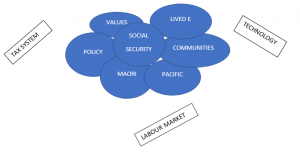By Mike O’Brien –
In this, the 80th anniversary of the passage of the Social Security Act 1938, the annual Child Poverty Action Group summit in Wellington was a very good opportunity to review directions and future possibilities. Bringing together the wide range of presentations and diverse material proved to be a rather interesting task. Through the inputs and contributions, a series of interlinked issues and themes emerged. The diagram below attempts to summarise these:
In brief, an effective and comprehensive social security system that works for all, especially children and families in the 21st century, needs to incorporate the following elements:
- A set of values which ensure that all recipients have an adequate income; the needs of children are well provided for; the rights of recipients are protected; and recipients are treated without stigma
- The system is built on sound, well-informed and well-developed policy, is clear and continuously reviewed and is subject to a process of robust and rigorous evaluation both for the policy itself and its implementation
- The rights of Māori as tangata whenua are advanced and protected, and the system actively works to reduce the levels of poverty among Māori
- The needs and aspirations of Pasifika peoples are central to legislation, implementation and delivery and, as with Māori, the system actively contributes to reducing the levels of poverty among Pasifika peoples
- The lived experiences of those who use the social security system proactively inform policy, implementation and delivery and there are robust processes to review and change the system in the light of those experiences
- Community groups have a central and proactive role in both contributing to the operation of the system, and in providing input into its review and development.
While these six elements are central to an effective and comprehensive social security system, that system does not sit in splendid isolation from the wider economy and society. Three considerations – the tax system, the labour market and technology – are all critical in shaping the ways that social security operates, the needs that it has to deal with, and the effectiveness of social security in ensuring that poverty, especially child poverty, is significantly reduced.
Associate Professor Mike O’Brien is an honorary academic in Counselling, Human Services and Social Work in the Faculty of Education and Social Work at the University of Auckland.


